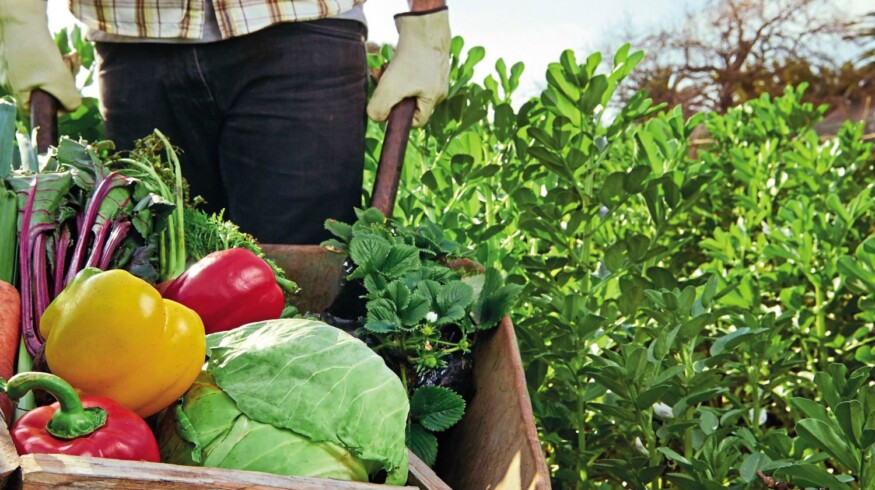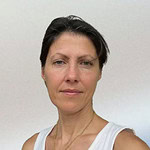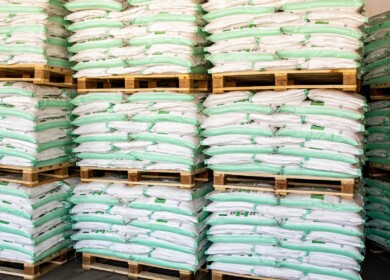Water soluble fertilizers from Almaz Group will help to intensify agricultural production in Russia

By 2024, the export capacity of Russia’s agroindustrial complex is expected to grow to 45 billion dollars. Agricultural producers will need to bring unused arable land under cultivation and increase the yield of the main export-oriented crops, grain and oilseeds, which cannot be achieved without increasing soil fertility.
At the exhibition “Golden Autumn 2019”, the Ministry of Agriculture of Russia announced its plan for an incremental increase in purchases and the use of mineral fertilizers. ‘We are guided by the figure of 8 million tons and hope that this is exactly the indicator that will be sufficient to bring Russia to the world’s leading countries in terms of yield of major agricultural crops,’ Roman Nekrasov, Director of the Department of Plant Production, Mechanization, Chemicalization and Plant Protection of the Ministry of Agriculture of the Russian Federation, told the exhibitors.
Moreover, as noted in the Russian Fertilizer Producers Association, mineral fertilizer producers are implementing large-scale investment programs to develop fertilizer storage and transshipment infrastructure in regions, from Kaliningrad to Petropavlovsk-Kamchatsky, investing billions of rubles. At present, the capacity of concurrent storage of the warehouse infrastructure of mineral fertilizers is about 1.5 million tons and continues to increase. This ensures the off-season accumulation of fertilizers and meeting the needs for them during the period of seasonal demand.
According to the Ministry of Agriculture of Russia, 3.1 million tons of fertilizers have already been purchased in this country as of the beginning of October; by the end of the year this figure is expected to reach 3.3 million tons (in terms of 100% of nutrients).
When growing vegetable, water soluble fertilizers (WSFs) are considered the most effective. However, Russian manufacturers of WSFs face several problems when selling their products on the domestic market. In particular, the current market situation is that it is more profitable for traders to sell foreign products at inflated prices, which directly depend on the exchange rate. It is more convenient for large agricultural complexes to buy from intermediaries because those have a wider range of products. When choosing who to buy fertilizers from, agricultural producers, of course, look at the price first.
‘But the main criterion for supplier selection is reliability. If they did not have issues with a certain supplier before, then they will choose that reliable supplier even with a difference of 10 rubles per ton. When it comes to choosing between which is more profitable for farmers to work with, a manufacturer or distributor, we need to be aware that large plants will not conclude contracts with greenhouses for small batches of 2-3 tons, they will pass the communication over to their sales representative or the regional distributor,’ said Nikolay Kapustinsky, representative of the Floralife fertilizer trading company.
Farms purchase small amounts of fertilizers from regional distribution centers and also collaborate directly with producers.
‘Before the procurement season, we hold talks with mineral fertilizer factories, negotiate discounts, although this is not always beneficial to the manufacturer. This year, they’ve come to the regional government with a proposal to provide subsidies to those plants with which farmer associations have concluded supply agreements. This will help to compensate for the difference in selling prices,’ said Vasily Lopatin, Chairman of the Board of the Association of Rural and Farm Enterprises and Agricultural Cooperatives of Stavropol Krai.
Often outright blatantly fake products are sold under the guise of fertilizers from trusted suppliers. Therefore, end consumers distrust the quality of domestic fertilizers. Although, according to agricultural chemists, in terms of purity, phosphorus fertilizers from Russian producers comply with and sometimes exceed the most rigid European requirements.
‘We have great potential for the use of phosphorus fertilizers that do not contain heavy metals, because we work with high-quality raw materials—apatite concentrate,’ said Mikhail Ovcharenko, President of National Agrochemical Union.
The Hydrometallurgical Plant (GMZ, Lermontov, Stavropol Krai), which is part of Almaz Group, specializes in the production of phosphorous WSFs. The company produces about 60 thousand tons of water soluble fertilizers per year, their share in the product line already amounts to 65%. The Hydrometallurgical Plant produces four types of water soluble fertilizers: monoammonium phosphate, diammonium phosphate, monopotassium phosphate (MKP) and potassium sulfate.
The plant is the only producer of MKP in Russia, which gives it a competitive advantage in the domestic market of mineral fertilizers. WSFs are sold exclusively through the trading house Cashmere Capital.
‘There is a significant amount of water soluble fertilizers on the Russian market that are imported from abroad,’ says Edward Gurary, Chief Commercial Officer at Cashmere Capital. ‘Often this is a low-quality product that can harm the health of consumers of farm products. Not all foreign brands of water soluble fertilizers are like this. But those that satisfy all quality criteria are significantly more expensive than the products of Russian manufacturers.’
According to Edward Gurary, GMZ was the first Russian fertilizer producer and for more than half a century has accumulated a great deal of significant scientific knowledge for the production of high-quality WSFs.
‘We have our own laboratory to carry out all the necessary examinations of our products. We are confident in the quality; therefore, we offer those farmers who have not made up their mind which WSFs to choose yet to take their time and carefully approach this issue after conducting all necessary examinations,’ he emphasized. ‘Cashmere Capital sells products at affordable prices and is ready to arrange a prompt delivery of goods within three to four days. We are interested in increasing supplies to the domestic market, as we see its potential for growth.’
Enjoyed this story?
Every Monday, our subscribers get their hands on a digest of the most trending agriculture news. You can join them too!














Discussion0 comments